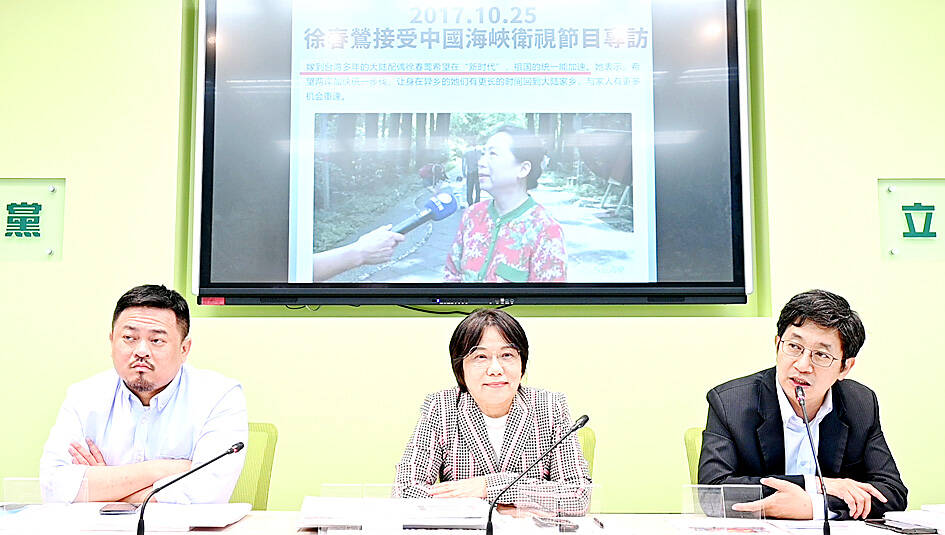Democratic Progressive Party (DPP) lawmakers yesterday said that if the Taiwan People’s Party (TPP) were to select a China-born legislative candidate it would pose national security concerns, while the TPP accused the ruling party of employing “double standards.”
The TPP has come under fire for its rumored selection of Taiwan New Residents Development Association chairwoman Xu Chunying (徐春鶯), the wife of a Taiwanese man and an advocate for foreign-born spouses, for its list of legislator-at-large nominees.
The TPP has yet to confirm or deny the selection of Xu, which was first reported by Mirror Media on Thursday last week.

Democratic Progressive Party (DPP) Legislator Tsai Shih-ying, right, speaks at a news conference held by the DPP caucus at the Legislative Yuan in Taipei yesterday.
Photo: Chu Pei-hsiung, Taipei Times
TPP Chairman and presidential candidate Ko Wen-je (柯文哲) on Sunday said that Xu was merely “under consideration” for a spot on the party’s list.
Xu in a statement released on Friday denied allegations that she was a member of the Chinese Communist Party (CCP) during her time in China, and that she had held a CCP-supervised position in Shanghai prior to moving to Taiwan in 1993.
Ko’s campaign director, Huang Shan-shan (黃珊珊), wrote on social media on Sunday that the DPP was hypocritical for criticizing Xu’s candidacy.
She said that the DPP appointed former CCP member Ning Jiarong (寧家榮) to an internal party committee several years ago.
The DPP should be consistent and “refrain from employing double standards,” Huang said.
Later the same day, Vice President William Lai, the DPP’s presidential candidate, told a campaign event in Hsinchu that Taiwanese “would not accept” Xu being given access to confidential foreign affairs and national defense documents.
Lai dismissed comparisons made between the TPP’s selection of Xu and the appointment of Ning to the DPP’s new residents committee, saying that the two cases were “completely different.”
Separately on Sunday, Ko told reporters that Xu would be asked not to sit on politically sensitive committees in the Legislative Yuan related to foreign affairs and national defense if elected as a TPP legislator, adding that she could instead join the legislature’s Internal Administration Committee.
Taiwan would not be considered a country ruled by law and order if a person who has obtained a Republic of China identification card cannot exercise the right to participate in politics, Ko added.
DPP Legislator Tsai Shih-ying (蔡適應) yesterday said that Ko’s remarks revealed two things.
“One is that the TPP has indeed decided to enlist Xu as one of its legislators-at-large,” Tsai said. “Second, it would be a ... conflict of interest if Xu were to be on the Internal Administration Committee, as the committee covers issues relating to laws such as the Act Governing Relations Between the People of the Taiwan Area and the Mainland Area (臺灣地區與大陸地區人民關係條例), Nationality Act (國籍法) and Household Registration Act (戶籍法), under all of which Xu is a person of concern,” he said.
Xu would not be a representative of the TPP, but a representative of the CCP in Taiwan, “which would be a great satire and pose great harm to Taiwan’s national security and democratic system,” Tsai added.
On Jan. 13 next year, Taiwanese are to vote to elect a president and vice president, as well as 113 members of the Legislative Yuan. This includes a total of 34 legislator-at-large seats, which are allocated to legislators selected from a party list rather than a constituency.
Additional reporting by Yang Yuan-ting
Source: Taipei Times - 2023/10/31




















